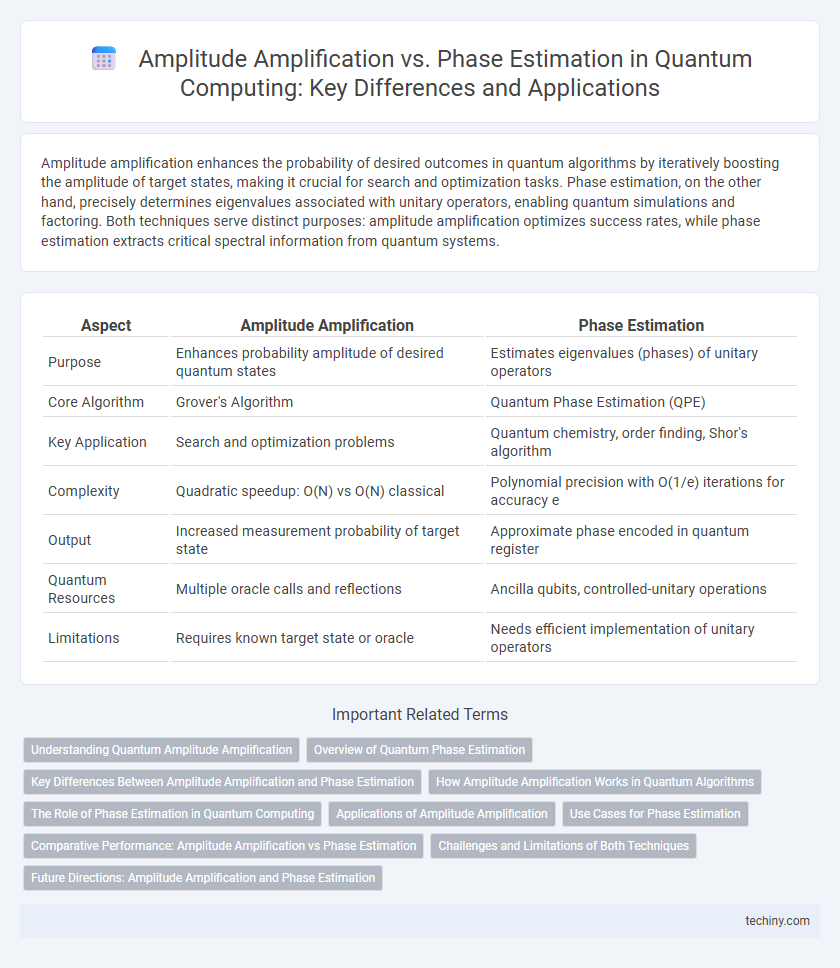Amplitude amplification enhances the probability of desired outcomes in quantum algorithms by iteratively boosting the amplitude of target states, making it crucial for search and optimization tasks. Phase estimation, on the other hand, precisely determines eigenvalues associated with unitary operators, enabling quantum simulations and factoring. Both techniques serve distinct purposes: amplitude amplification optimizes success rates, while phase estimation extracts critical spectral information from quantum systems.
Table of Comparison
| Aspect | Amplitude Amplification | Phase Estimation |
|---|---|---|
| Purpose | Enhances probability amplitude of desired quantum states | Estimates eigenvalues (phases) of unitary operators |
| Core Algorithm | Grover's Algorithm | Quantum Phase Estimation (QPE) |
| Key Application | Search and optimization problems | Quantum chemistry, order finding, Shor's algorithm |
| Complexity | Quadratic speedup: O(N) vs O(N) classical | Polynomial precision with O(1/e) iterations for accuracy e |
| Output | Increased measurement probability of target state | Approximate phase encoded in quantum register |
| Quantum Resources | Multiple oracle calls and reflections | Ancilla qubits, controlled-unitary operations |
| Limitations | Requires known target state or oracle | Needs efficient implementation of unitary operators |
Understanding Quantum Amplitude Amplification
Quantum amplitude amplification enhances the probability of measuring a desired quantum state by iteratively applying a specific operator, effectively boosting success rates beyond classical limits. It generalizes Grover's algorithm, enabling faster search and optimization in unstructured databases. Unlike phase estimation, which focuses on determining eigenvalues with high precision, amplitude amplification directly increases the amplitude of target states to improve output probabilities in quantum algorithms.
Overview of Quantum Phase Estimation
Quantum Phase Estimation (QPE) is a fundamental algorithm in quantum computing designed to determine the eigenphase of a unitary operator with high precision. It leverages a series of controlled unitary operations and inverse quantum Fourier transform to extract the phase information encoded in eigenstates, enabling applications in quantum chemistry, factoring, and quantum simulations. QPE provides a crucial framework for algorithms requiring precise phase measurements, distinguishing it from amplitude amplification techniques focused on probability enhancement rather than phase resolution.
Key Differences Between Amplitude Amplification and Phase Estimation
Amplitude amplification enhances the probability of finding the desired outcome in a quantum state by iteratively increasing its amplitude, whereas phase estimation determines the eigenvalue (phase) corresponding to an eigenvector of a unitary operator with high precision. Amplitude amplification is often used to speed up search algorithms like Grover's algorithm, while phase estimation serves as a fundamental subroutine in algorithms such as Shor's factoring algorithm and quantum simulations of physical systems. The key difference lies in amplitude amplification modifying measurement probabilities directly, whereas phase estimation extracts phase information representing eigenvalues in quantum computing tasks.
How Amplitude Amplification Works in Quantum Algorithms
Amplitude amplification enhances the probability of measuring desired quantum states by iteratively applying the Grover operator, which combines the oracle and diffusion operators to increase target state amplitudes. This technique improves search algorithms by quadratically speeding up solution identification compared to classical counterparts. Unlike phase estimation that extracts eigenvalue information, amplitude amplification directly boosts solution likelihood, making it fundamental in optimization and search quantum algorithms.
The Role of Phase Estimation in Quantum Computing
Phase estimation plays a critical role in quantum computing by enabling precise measurement of eigenvalues associated with unitary operators, which is essential for algorithms like Shor's factoring and quantum simulations. Unlike amplitude amplification, which boosts the probability amplitude of desired states, phase estimation extracts key spectral information that drives quantum algorithm efficiency and accuracy. This process underpins advancements in quantum chemistry, optimization problems, and error correction by facilitating the identification of quantum system properties at unprecedented scales.
Applications of Amplitude Amplification
Amplitude amplification significantly enhances the probability of finding desired solutions in unstructured search problems, such as database searching and combinatorial optimization tasks. It powers quantum algorithms like Grover's algorithm, making it pivotal in cryptography for accelerating key search and in machine learning for improving pattern recognition efficiency. The technique is also essential in quantum simulations where it boosts the success rate of identifying ground states or specific quantum states.
Use Cases for Phase Estimation
Phase estimation is crucial for precise eigenvalue determination in quantum algorithms, enabling applications like Shor's factoring algorithm and quantum simulation of molecular energies. It excels in extracting phase information from unitary operations, which is essential for solving problems in cryptography, chemistry, and optimization. This makes phase estimation fundamental for tasks requiring accurate measurement of quantum states' properties in complex computational processes.
Comparative Performance: Amplitude Amplification vs Phase Estimation
Amplitude amplification outperforms phase estimation in iterative algorithms by quadratically increasing the probability of finding a target state, making it highly efficient for unstructured search problems. Phase estimation excels at precisely determining eigenvalues of unitary operators, which is crucial for applications like quantum chemistry and solving linear systems. Performance trade-offs depend on problem type, with amplitude amplification offering speed advantages in search tasks, while phase estimation provides accuracy critical for spectral analysis.
Challenges and Limitations of Both Techniques
Amplitude amplification faces challenges in error accumulation and requires precise oracle construction, limiting its practical scalability on noisy quantum hardware. Phase estimation demands high coherence times and accurate controlled-unitary operations, which are difficult to maintain with current quantum technology. Both techniques struggle with resource-intensive implementations and sensitivity to noise, restricting their effectiveness in near-term quantum devices.
Future Directions: Amplitude Amplification and Phase Estimation
Future directions in amplitude amplification focus on enhancing quantum search algorithms by reducing error rates and increasing scalability through adaptive techniques. Phase estimation research aims to improve precision in eigenvalue determination, critical for quantum simulation and cryptography, by developing robust error correction and noise-resilient protocols. Integrating amplitude amplification with phase estimation promises advances in quantum algorithm efficiency, enabling breakthroughs in optimization and complex system modeling.
amplitude amplification vs phase estimation Infographic

 techiny.com
techiny.com